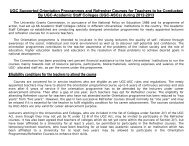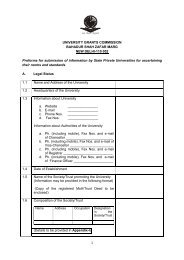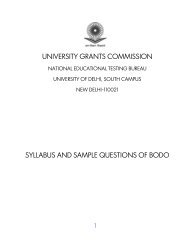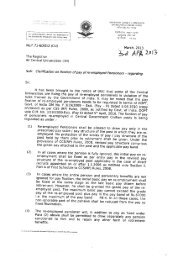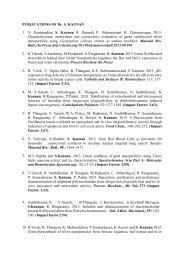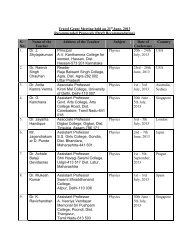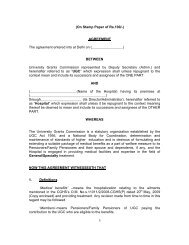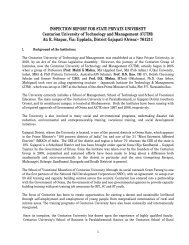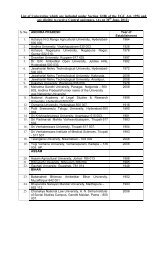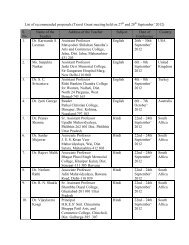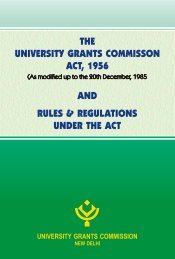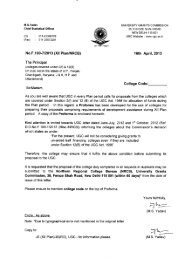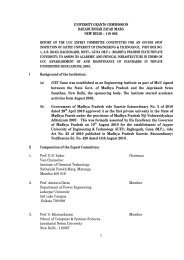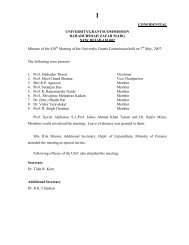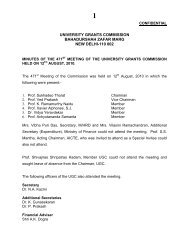Guidelines for Students' Entitlement These guidelines have been ...
Guidelines for Students' Entitlement These guidelines have been ...
Guidelines for Students' Entitlement These guidelines have been ...
You also want an ePaper? Increase the reach of your titles
YUMPU automatically turns print PDFs into web optimized ePapers that Google loves.
<strong>Guidelines</strong> <strong>for</strong> Students’ <strong>Entitlement</strong><br />
<strong>These</strong> <strong>guidelines</strong> <strong>have</strong> <strong>been</strong> issued by the University Grants Commission (UGC) in order to help students,<br />
teachers, administrators and institutions understand what the minimum entitlements of the students<br />
are. <strong>These</strong> <strong>guidelines</strong> apply to all the colleges and universities in the country (this expression includes<br />
every institutions of higher education even if it is not called college/university) without any exception. It<br />
shall be mandatory <strong>for</strong> every college/university to publish the present <strong>Guidelines</strong> in full in its Prospectus<br />
and also post it on the homepage of its website.<br />
Fulfillment of these entitlements imposes obligations on educational institutions, administrators, policy<br />
makers, teachers and students themselves. If these obligations are not met, a student can approach the<br />
Grievance Redressal Authority or the Ombudsman. Any serious or persistent violation of these<br />
<strong>Guidelines</strong> can be brought to the notice of the University Grants Commission and can be the basis of<br />
punitive action against the offender.<br />
Some of the provisions stated here are already covered by existing laws or Rules and Regulations of the<br />
UGC. But the students shall continue to enjoy all the right under existing laws, rules and regulations<br />
which may not <strong>have</strong> <strong>been</strong> mentioned in these <strong>Guidelines</strong>.<br />
1. Admission<br />
1.1. An announcement or advertisement <strong>for</strong> any course of study must clearly specify whether the<br />
degree granted is notified by the UGC and other relevant statutory authorities [Under Section<br />
22 c of the UGC Act, latest list available at the UGC website] and whether the university that<br />
awards the degree figures in the list of universities maintained by the UGC [available at the<br />
UGC website].<br />
1.2. A student seeking admission is entitled to a document (usually called ‘Prospectus’) that<br />
specifies the curricula including syllabi, names and academic profile and status of the faculty,<br />
mode and frequency of evaluation, duration of the course, academic calendar, comprehensive<br />
in<strong>for</strong>mation about fees or charges of any kind, and refund rules. The in<strong>for</strong>mation given in the<br />
prospectus should not be changed to the disadvantage of the student during the course of<br />
study; any change if necessary must be communicated to each student individually spelling out<br />
reasons <strong>for</strong> such a change.<br />
1.3. The Prospectus must spell out exactly the process and criteria <strong>for</strong> admissions. This includes<br />
weightage given to previous academic per<strong>for</strong>mance, entrance examination and interview. The<br />
syllabi and <strong>for</strong>mat of the entrance examination must be spelt out. The final scores of each<br />
candidate who appeared <strong>for</strong> entrance examination including all the components and the entire<br />
waiting list must be made public.<br />
1.4. In<strong>for</strong>mation about any reservations or quota <strong>for</strong> any category, the eligibility criteria <strong>for</strong> these<br />
reservations/quotas, certificate required <strong>for</strong> seeking admission under these must be stated<br />
clearly in the Prospectus.<br />
1.5. The student must not be asked to produce documents which <strong>have</strong> not <strong>been</strong> mentioned in the<br />
Prospectus. While the institution can ask the student to produce the original documents (such<br />
as School Leaving Certificate, Marksheet, Caste certificate) <strong>for</strong> verification, they cannot retain
any original documents of any students. [As notified by UGC on 23 rd April 2007, F. No. 1-3/2007<br />
(CPP II)]<br />
2. Quality of teaching and learning<br />
2.1. It is the responsibility of the college/university to help the students develop their learning skills<br />
by facilitating the creation of learner centric environment conducive <strong>for</strong> quality education. The<br />
students are entitled to receiving instruction and reading material in all the languages allowed<br />
by the institution as medium of instruction or examination.<br />
2.2. The students who begin with a difficulty due to social handicap or a shift in the medium of<br />
instruction are entitled to special support to bridge the gap.<br />
2.3. The students are entitled to availability and presence of qualified teacher, fulfillment of the<br />
specified number of teaching days and contact hours <strong>for</strong> each course and completion of<br />
syllabus on time. [UGC Regulations on Minimum Qualification of Teachers… 2010]<br />
2.4. The students are entitled to reasonable access to facilities, services and resources including<br />
library (that stocks textbooks, reference books, journals, e-resources), laboratories, and ICT<br />
facilities in the languages permitted as medium of instruction or examination.<br />
2.5. The student are entitled to fair, transparent and timely evaluation, including fair provisions <strong>for</strong><br />
timely re-checking or re-evalutation of the scripts and redressal of any grievance related to the<br />
evaluation process. The students are entitled to a copy of their answer scripts after the<br />
declaration of results.<br />
2.6. The students are entitled to timely conduct of examination and declaration of results as<br />
specified in the academic calendar in the Prospectus. They shall be entitled to the award of<br />
degree within 180 days of the declaration of results.<br />
2.7. The students are entitled to give regular feedback on the quality of teaching, students services<br />
and institutional infrastructure. The college/university shall establish mechanisms <strong>for</strong> seeking<br />
this feedback regularly and taking student feedback into account <strong>for</strong> review and improvement.<br />
3. Fee and financial aid<br />
3.1. The students are entitled to prior and full in<strong>for</strong>mation about amount, components, frequency<br />
and mode of any kind of payment including fees or charges of any other kind and refund rules.<br />
If a student withdraws be<strong>for</strong>e the beginning of the course, the student should be refunded the<br />
entire fee given to it with a maximum deduction of Rs. 1000. [As notified by UGC on 23 rd April<br />
2007, F. No. 1-3/2007 (CPP II)]<br />
3.2. A college/university will make utmost ef<strong>for</strong>t to ensure that no student is deprived of<br />
opportunities of quality education <strong>for</strong> lack of sufficient financial resources. It is the<br />
responsibility of the policy makers to ensure that sufficient funds are made available to<br />
implement this principle. The Prospectus shall contain consolidated in<strong>for</strong>mation about<br />
scholarship/fellowship/financial aid scheme of any type that that is available to the students. It<br />
shall bring to notice and assist the students in accessing such schemes. It shall ensure that the<br />
procedure <strong>for</strong> selection is fair and transparent.
4. Infrastructure<br />
4.1. The students are entitled to access to appropriate resources including classrooms, libraries,<br />
laboratories and other academic facilities necessary <strong>for</strong> quality education. [UGC rules and<br />
regulations <strong>for</strong> fitness of universities and colleges <strong>for</strong> Grants under section 12 B of the UGC Act<br />
1956, Private University Regulation, Deemed University Regulation].<br />
4.2. The students are entitled to reasonable access to sports and recreation facilities, avenues <strong>for</strong><br />
literary, aesthetic and other extra-curricular pursuits.<br />
4.3. The student are entitled to reasonable attention to medical and heath requirements including<br />
free and periodic health check-up and treatment/hospitalization in case of medical<br />
emergencies.<br />
4.4. The students are entitled to a reasonable access to adequate, clean and hygienic<br />
hostel/residence accommodation that provides basic amenities including recreational facilities.<br />
Such accommodation should be af<strong>for</strong>dable and must not be utilized by the institution <strong>for</strong> profit<br />
making. Accommodation meant <strong>for</strong> students must not be encroached upon by the institution<br />
<strong>for</strong> any other purpose.<br />
4.5. Student with disability are entitled to access to all schemes, facilities and services in the<br />
university without discrimination. The college/university shall strive towards a universal design<br />
of learning based curriculum that can address the needs of the broadest possible range of<br />
students by minimizing barriers and maximizing learning <strong>for</strong> all students. The college/university<br />
shall provide barrier free access, special library resources (including Braille and ICT resources],<br />
provisions <strong>for</strong> sign language interpreter/transcriber, the required equipments and electronic<br />
resources and the required relaxation in examination to all students with disability. [Person<br />
with Disabilities (Equal Opportunity, Protection of Rights and Full Participation) Act, 1995; UGC<br />
D.O.No.F-6-1/2006(CPPII), F.No.6-1/2012(SCT)]<br />
5. The students are entitled to non-discriminatory treatment (in the sense of absence of harassment,<br />
victimization or exclusion) in every aspect of institutional functioning. Any discrimination based on<br />
caste, gender, creed, colour, race, religion, place of birth, political conviction, language and disability<br />
shall be prohibited.<br />
5.1. In particular, institutions shall not discriminate against students belonging to Scheduled Caste<br />
and Scheduled Tribes and racial profiling of students from any region or ethnic group. [UGC<br />
(Promotion of Equity in Higher Educational Institutions) Regulations, 2012]<br />
5.2. The students are entitled to protection from sexual harassment by complaining to the Gender<br />
Sensitization Committees against Sexual Harassment. It is mandatory <strong>for</strong> each<br />
college/university to constitute and publicize this committee as per the <strong>Guidelines</strong> and norms<br />
laid down by the Hon’ble Supreme Court [Vishaka and Others Vs. State of Rajasthan and<br />
Others(JT 1997 (7) SC 384)]<br />
5.3. All students are entitled to protection from ragging in any <strong>for</strong>m [UGC (Curbing the Menace of<br />
Ragging) Regulation, 2009]<br />
6. As democratic citizens, the students are entitled to freedom of thought and expression within and<br />
outside their institution. The college/university must allow space <strong>for</strong> free exchange of ideas and
public debate so as to foster a culture of critical reasoning and questioning. College/university<br />
authorities must not impose unreasonable, partisan or arbitrary restrictions on organizing seminars,<br />
lecture and debates that do not otherwise violate any law.<br />
7. The students are entitled to <strong>for</strong>ming associations and unions, directly electing their representatives<br />
to Students Unions and having their representatives on the college/university decision making<br />
bodies including internal quality assessment, grievance committees, Gender Sensitization<br />
Committees against Sexual Harassment and the Academic/Executive council. University/colleges<br />
shall evolve mechanisms <strong>for</strong> adequate consultations with students’ representatives be<strong>for</strong>e taking<br />
any major decision affecting the students.<br />
8. The students are entitled to full and correct in<strong>for</strong>mation about any institution of higher education in<br />
which they study or propose to study. There<strong>for</strong>e, every college/university must disclose the<br />
following in<strong>for</strong>mation on its website and Prospectus: status of the institution, its affiliation,<br />
accreditation rating, physical assets and amenities, membership of governing bodies and minutes of<br />
the meetings of bodies like Academic/Executive council, sources of income and the financial<br />
situation and any other in<strong>for</strong>mation about its functioning necessary <strong>for</strong> a student to make a fully<br />
in<strong>for</strong>med choice. [Section 4 (1) of Right to In<strong>for</strong>mation Act 2005]<br />
9. The students are entitled to redressal of their grievance by the Grievance Redressal Committee of<br />
the institution within 10 days of making a representation. If they are not satisfied, they are also<br />
entitled to an appeal to the Ombudsman of the University concerned <strong>for</strong> redressal within 30 days.<br />
[UGC (Grievance Redressal) Regulations, 2012]<br />
10. The UGC may issue instructions <strong>for</strong> proper implementation of these <strong>Guidelines</strong>.



